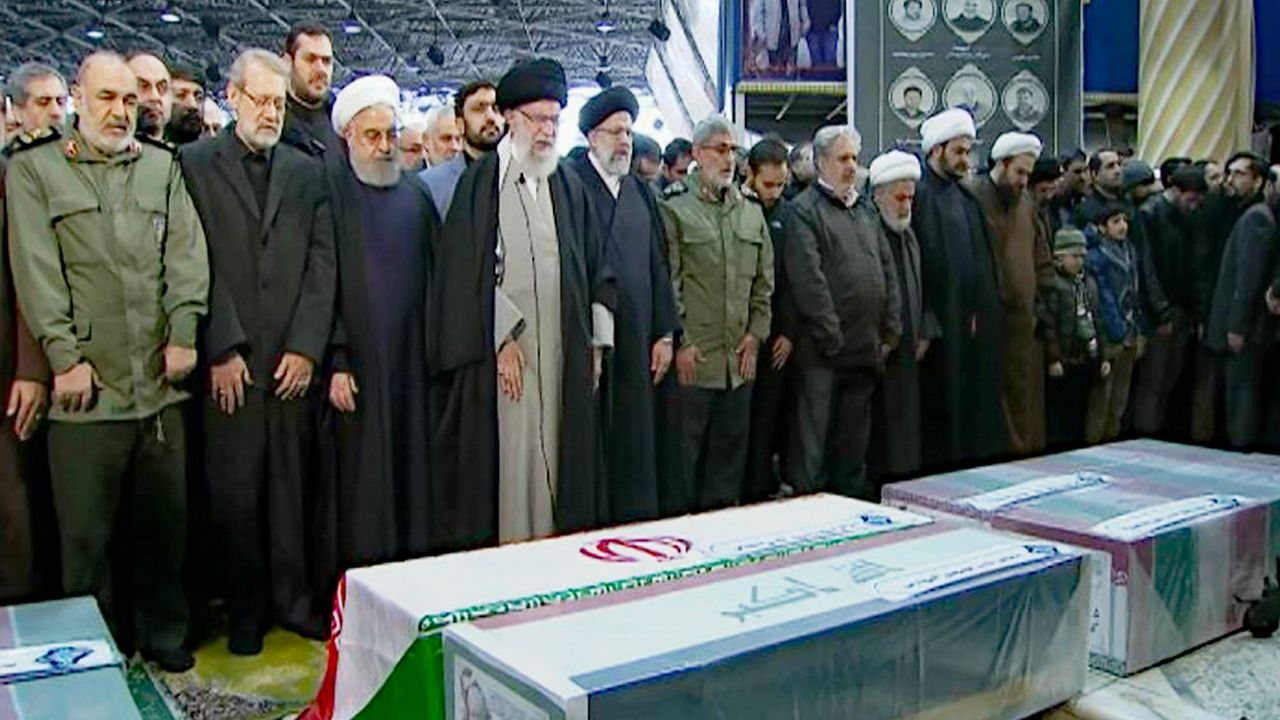TEHRAN, Iran — Thousands flooded the streets of Tehran this weekend to honor Iranian Gen. Qasem Soleimani, who was killed by a U.S. drone strike on Friday at a Baghdad airport.
- U.S. officials says Gen. Qasem Soleimani was responsible for American deaths
- RELATED stories:
- JUMP TO: Interactive timeline of the history of the US-Iran relationship ▼
Weeping amid wails from a sea of mourners, Iran's supreme leader on Monday prayed over the remains of the 62-year-old Soleimani, who was killed in a U.S. airstrike in Baghdad, an attack that has drastically raised tensions between Tehran and Washington.
Iran's Supreme Leader Ayatollah Ali Khamenei himself prayed over the caskets of Soleimani and others slain in the attack. Khamenei, who had a close relationship with Soleimani, wept at one point during the traditional Muslim prayers for the dead.
The targeted killing of Soleimani drew a crowd, said by police to be in the millions, on Monday in Tehran, where Soleimani's replacement Esmail Ghaani vowed to take revenge.
In a news release on Thursday, Jan. 02, the Pentagon released the following as to why Soleimani was targeted.
"General Soleimani was actively developing plans to attack American diplomats and service members in Iraq and throughout the region. General Soleimani and his Quds Force were responsible for the deaths of hundreds of American and coalition service members and the wounding of thousands more," the release stated. "He had orchestrated attacks on coalition bases in Iraq over the last several months – including the attack on December 27th – culminating in the death and wounding of additional American and Iraqi personnel. General Soleimani also approved the attacks on the U.S. Embassy in Baghdad that took place this week."
Additionally, Tehran has abandoned the remaining limits of its 2015 nuclear deal with world powers in response to the slaying. The developments could bring Iran closer to building an atomic bomb, set off a proxy or military attack launched by Tehran against America and enable the Islamic State terrorist group to stage a comeback in Iraq, making the Middle East a far more dangerous and unstable place.
Meanwhile, President Donald Trump tweeted a warning that if Iran attacks any American asset, the U.S. will "hit them harder than they have ever been hit before."
They attacked us, & we hit back. If they attack again, which I would strongly advise them not to do, we will hit them harder than they have ever been hit before! https://t.co/qI5RfWsSCH
— Donald J. Trump (@realDonaldTrump) January 5, 2020
Meanwhile French President Emmanuel Macron, German Chancellor Angela Merkel and British Prime Minister Boris Johnson issued a joint statement calling on all parties to "exercise utmost restraint" saying there is "an urgent need for de-escalation."
While in Iraq, the parliament has called for the expulsion of all American troops from Iraqi soil. Iraqi officials have started taking steps toward getting all foreign forces out of Iraq, according to its prime minister.
The U.S. military presence in the Middle East was thrown into jeopardy Sunday, as Iraq's parliament voted to expel U.S. troops from their country.
Trump has warned Iraq that he would levy punishing sanctions if it expelled American troops in retaliation for a U.S. airstrike in Baghdad that killed Soleimani.
The Associated Press contributed to this story.
Interactive Timeline




